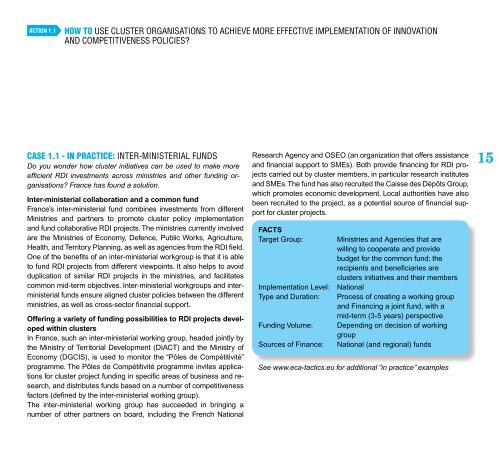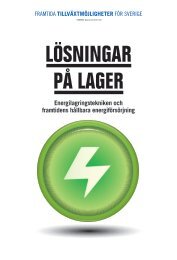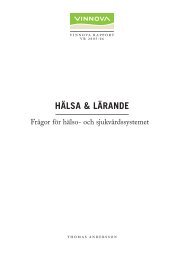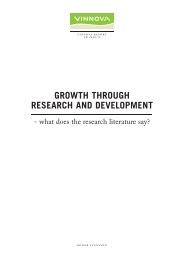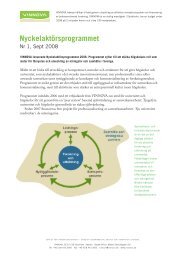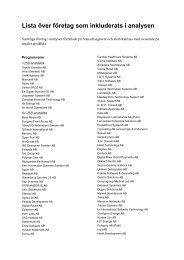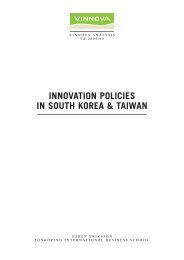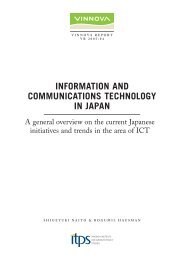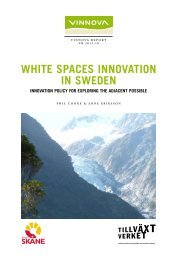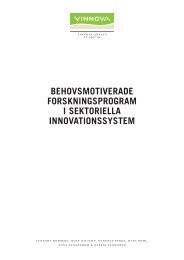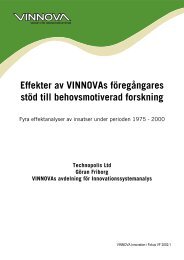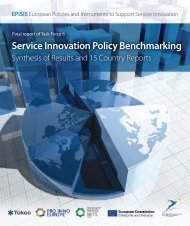tactics - Vinnova
tactics - Vinnova
tactics - Vinnova
Create successful ePaper yourself
Turn your PDF publications into a flip-book with our unique Google optimized e-Paper software.
ACTION 1.1<br />
HOW TO USE CLUSTER ORGANISATIONS TO ACHIEVE MORE EFFECTIVE IMPLEMENTATION OF INNOVATION<br />
AND COMPETITIVENESS POLICIES?<br />
CASE 1.1 - IN PRACTICE: INTER-MINISTERIAL FUNDS<br />
Do you wonder how cluster initiatives can be used to make more<br />
efficient RDI investments across ministries and other funding organisations?<br />
France has found a solution.<br />
Inter-ministerial collaboration and a common fund<br />
France’s inter-ministerial fund combines investments from different<br />
Ministries and partners to promote cluster policy implementation<br />
and fund collaborative RDI projects. The ministries currently involved<br />
are the Ministries of Economy, Defence, Public Works, Agriculture,<br />
Health, and Territory Planning, as well as agencies from the RDI field.<br />
One of the benefits of an inter-ministerial workgroup is that it is able<br />
to fund RDI projects from different viewpoints. It also helps to avoid<br />
duplication of similar RDI projects in the ministries, and facilitates<br />
common mid-term objectives. Inter-ministerial workgroups and interministerial<br />
funds ensure aligned cluster policies between the different<br />
ministries, as well as cross-sector financial support.<br />
Offering a variety of funding possibilities to RDI projects developed<br />
within clusters<br />
In France, such an inter-ministerial working group, headed jointly by<br />
the Ministry of Territorial Development (DIACT) and the Ministry of<br />
Economy (DGCIS), is used to monitor the “Pôles de Compétitivité”<br />
programme. The Pôles de Compétitivité programme invites applications<br />
for cluster project funding in specific areas of business and research,<br />
and distributes funds based on a number of competitiveness<br />
factors (defined by the inter-ministerial working group).<br />
The inter-ministerial working group has succeeded in bringing a<br />
number of other partners on board, including the French National<br />
Research Agency and OSEO (an organization that offers assistance<br />
and financial support to SMEs). Both provide financing for RDI projects<br />
carried out by cluster members, in particular research institutes<br />
and SMEs. The fund has also recruited the Caisse des Dépôts Group,<br />
which promotes economic development. Local authorities have also<br />
been recruited to the project, as a potential source of financial support<br />
for cluster projects.<br />
FACTS<br />
Target Group:<br />
Ministries and Agencies that are<br />
willing to cooperate and provide<br />
budget for the common fund; the<br />
recipients and beneficiaries are<br />
clusters initiatives and their members<br />
Implementation Level: National<br />
Type and Duration: Process of creating a working group<br />
and Financing a joint fund, with a<br />
mid-term (3-5 years) perspective<br />
Funding Volume: Depending on decision of working<br />
group<br />
Sources of Finance: National (and regional) funds<br />
See www.eca-<strong>tactics</strong>.eu for additional “in practice” examples<br />
15


